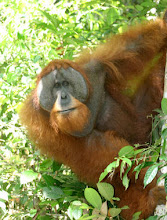The world’s voracious appetite for palm oil - an ingredient found in up to half of all packaged supermarket products in the UK - is fuelling the destruction of some of the most biodiverse rainforests on the planet, home to countless species, including the critically endangered Sumatran orangutan (see www.orangutans-sos.org). Whilst every individual has the right to make choices about the food they eat and the cosmetics they use, I feel that a boycott of products containing palm oil is not the answer to saving Indonesia’s forests, for a number of reasons.
In order to boycott products containing palm oil, you need to know which ones to avoid – which is not easy. Palm oil is usually a hidden ingredient in food and cosmetic products, listed simply as “vegetable oil” on packaging, so it is currently almost impossible to make informed choices about what you buy at the supermarket.
Even armed with a palm-oil-free shopping list, protesting with your wallet may have some unintended consequences. Oil palms are the most productive oil seed in the world – more than 10 times as much oil is produced from a hectare of oil palms as other crops. If companies are forced to switch to alternative oils, even more land could be put at risk by increasing demand for oils which need larger plantations. Soybeans, for example, tend to be grown under a similar model to oil palms: huge monocultures, often at the expense of tropical forests in South America. We do not want to export the problem - saving the Southeast Asian rainforests from conversion at the expense of the Brazilian Amazon, swallowing up even more forest in the process. We simply want forest conversion to stop.
Palm oil is a “wonder crop” when it comes to meeting the huge global demand for vegetable oils, accounting for more than a third of the world’s supply. Countries such as India and China rely on huge palm oil imports to meet their populations’ nutritional needs, bringing billions of dollars to top producer countries such as Indonesia and Malaysia. As long as the world needs vegetable oil, there is no question that the palm oil industry will continue to grow; what we need to be concerned with how this expansion happens.
The development of new oil palm plantations does not need to entail forest destruction. While precious ecosystems are being devastated, millions of hectares of abandoned land lie idle, available for cultivation. It is estimated that the amount of land growing oil palms in Indonesia could quadruple without impacting forests (http://www.projectpotico.org/), enabling the industry to grow whilst drastically reducing its environmental footprint.
The Roundtable on Sustainable Palm Oil (www.rspo.org) was established to create a clear set of standards for reducing the environmental impacts of the industry. Change has been slow, and it’s not a perfect system, but oil certified as sustainable according to these standards has started to trickle into the world market.
Many millions of hectares of forests have already been lost to the palm oil industry. It is absolutely critical that the conversion of forests is stopped. We need more research into how to increase output on existing plantations, as current yields are in many cases well below their potential, and this would reduce the need for cultivating more land. Environmentally-sensitive land use planning, improved productivity, responsible investment by banks and purchasing by manufacturers and retailers are all crucial to halt the conversion of Indonesia’s forests for agricultural development.
So what can you do to help? If you know a certain product contains palm oil, and would rather not to buy it on that basis, make sure that you write to the company that makes it and tell them. You can also demand that companies use only certified sustainable palm oil, and to clearly label this on their packaging. Making your voice heard really can make a difference – several big companies have already made commitments to cleaning up their palm oil supply after hearing from their customers about this issue (see http://bit.ly/9yIPwT for a list). We can all also pressure our elected officials to make decisions that help conserve our planet's limited resources and threatened biodiversity, and save precious species, including the orangutan, from extinction.
For further information on the environmental and social impacts of the palm oil industry see: www.orangutans-sos.org/campaigns/palm_oil_and_biofuels/
Read more...








.jpg)















